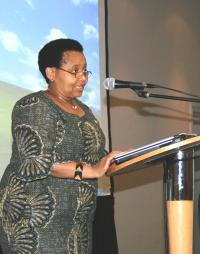Posted on October 17, 2009

In her opening address, the new Arts and Culture Minister, the Honourable Lulu Xingwana, pointed out that one of the most important reasons for promoting oral history was the validation of African voices in history-making and heritage practice. Chitja Twala from the Free State Provincial Heritage Authority, spoke, for example, from the perspective of both pilgrim and heritage practitioner, describing the unwritten cultural protocols associated with visits to sacred cave sites in the Free State. Rituals performed at these caves now include Christian ceremonies and the burning of candles. Twala underlined the need to balance respect for these traditional cultural practices with the protection of the sites from vandalism. Another presentation, by Chris Wasike, raised the problem of Kenyan burial practices that, consciously or unconsciously, validate the dominance of men in society.
The Minister reminded delegates of the credo -Ânothing about us without -Â in doing oral history. The politics of who speaks, what issues they choose to speak on, and how this affects what they can say, needs more critical reflection in the field of archive and heritage. For example, Themba Qwabe, who spoke on female initiation songs, was challenged from the floor for revealing cultural secrets. He responded that he had not actually attended rituals proscribed for men, but asked participants to report back afterwards. This raised the question of how researchers remain both ethical and curious, while being sensitive to questions of human rights associated with cultural practices. We'll explore this issue further through the guest blogs in the next few months.
The boundary between academic research, heritage practice and human rights activism is increasingly blurred. MW Nxumalo found that there was little oral history research on the experiences of farm-workers working on white farms in KZN, even though the actions of farmers often contravened human rights and basic conditions of employment. David Thelen and Natasha Erlank reported on a project to strengthen bonds between neighbours in Sophiatown, blurring the distinction between community work and research. They found that the best method of engaging people separated by cultural, historical and physical barriers was not to broach apartheid experiences directly, but to allow them to share their experiences of the past by discussing their photographs of sites in the area.
As Professor Phil Bonner pointed out in the keynote address, we have to start taking both collective and individual memory seriously. Bonner said that a legalistic, forensic approach to the history of Apartheid has become more powerful than narrative and individual testimony. He suggested that the Truth and Reconciliation Commission, for example, had succeeded in important ways, but had had to deliver on too many mandates. The TRC therefore produced too little historical truth and too much reconciliation, underplaying historical explanation and individual narrative. Bonner suggested that in writing a history of apartheid one cannot simply divide people into victims and oppressors. We have to document the daily traumatic experiences of discrimination and the ways people underplay these experiences today, as well as the fact that people did not always live racially divided lives in the past. One of the areas of critical debate, discussed in our guest blog this month, has been the use of Apartheid-era racial terminology to describe complex social realities.